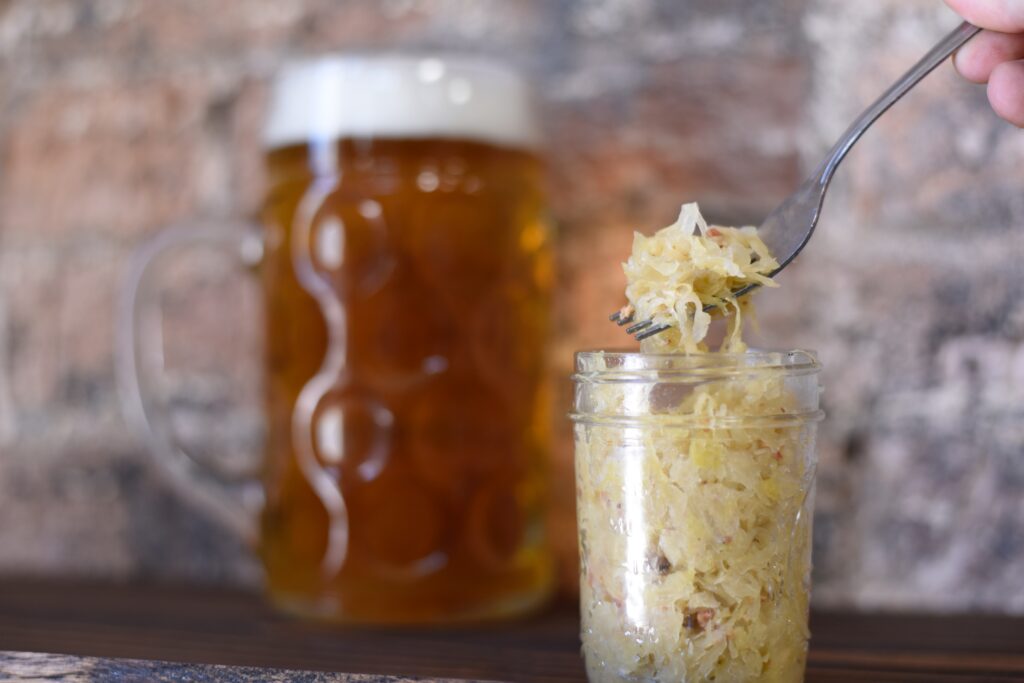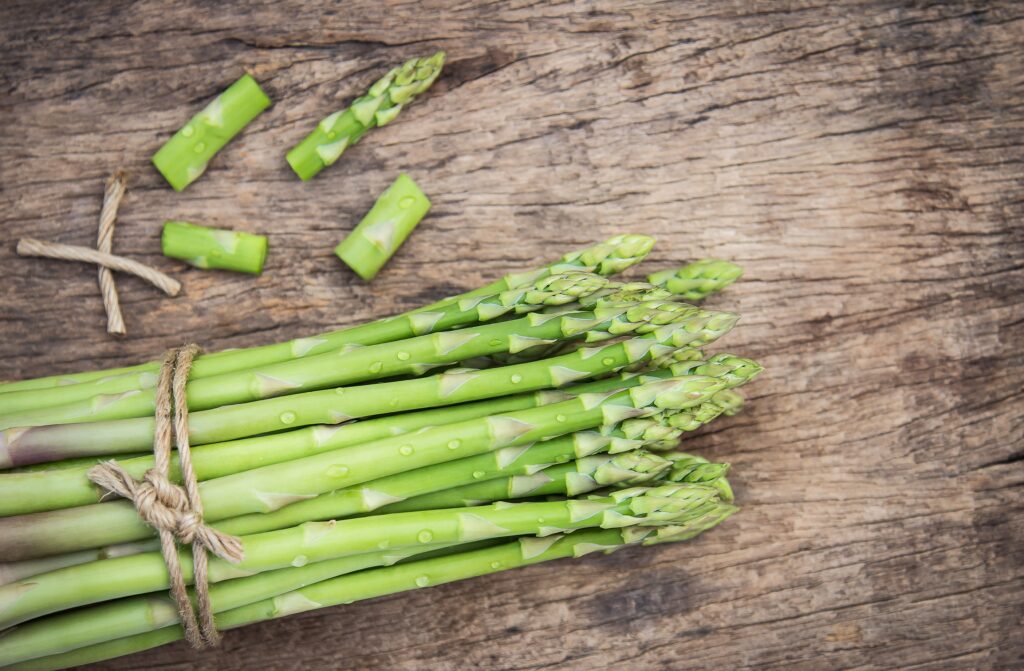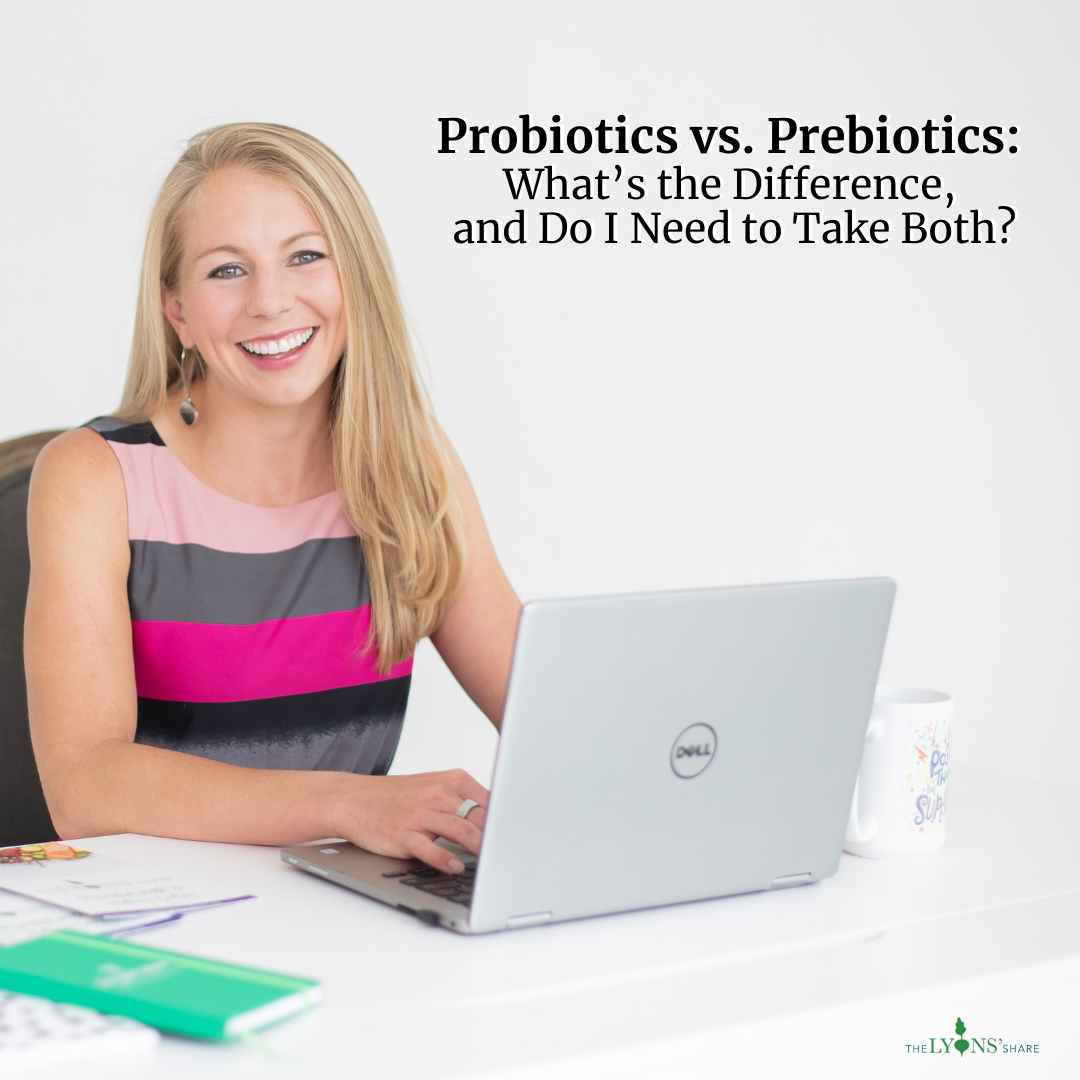As we dive into a brand new year, many of us are thinking about all the things we can do for our health. I will always encourage you to start with the basics, like drinking more water, walking, taking mental breaks via meditation or a morning routine, and eating more vegetables. But if you’ve already got those mastered, a potential next step might be considering which supplements could improve your daily health. Any Google search will likely lead you to probiotics, which are one of the most highly recommended supplements (for good reason!), but then you might get led down a rabbit hole … which probiotics are best? Do you need prebiotics, too? Should we get them from food instead of pills? In this post, I’ll answer all of those questions and more!
Why gut health is important
You may know by now that probiotics are important for gut health. But why is gut health important? The short answer is that a healthy microbiome is essential for us to absorb nutrients from our food and have healthy and comfortable digestion. But did you know that gut health also helps you maintain a strong immune system (yep! 80% of your immune system is in your gut!), improve brain health, sustain emotional balance, and balance energy levels throughout the day? Lots more on gut health and why it’s important in this post!
How probiotics improve gut health
So now that we know that gut health is important, what do probiotics have to do with gut health? Well, when we refer to the “gut,” we’re not only referring to the physical structures (the “tubing” if you will, which facilitates the transfer of food in and out of our bodies), but also all of the things living inside that tubing.

What?! There are things living inside my tubing?! Yes, yes there are. In fact, there are 100 trillion bacteria comprised of about 1,000 strains living in your body right now. And they’re doing great work – they’re helping you metabolize your food, protecting you against foreign invaders, and providing a lot of constant feedback to your brain about how your body is doing. They’re very important!
But sadly, they get killed off regularly, by stress (the big one!), antibiotic usage (another big one!), pollution, toxins from beauty and cleaning products, and so much more.
Probiotics are simply living strains of bacteria that help you keep all the bugs in balance. Sometimes, we can get overridden by negative bacteria instead of the good guys I mentioned above. Taking probiotics, or eating probiotic-rich food, helps strengthen up the good army so that it can keep the bad guys in check.
Probiotics vs. prebiotics
Now we know that probiotics are actually bacteria that we ingest to strengthen the army of good bacteria that do so much for our health. So let me explain probiotics vs. prebiotics.
Prebiotics are specialized plant fibers that humans cannot digest, but they are food for the good guys – all of those bacteria we’ve been talking about! So, in a way, prebiotics are food for the probiotics you’re taking. When we have enough prebiotics, the probiotics can work much more efficiently.
Should we get probiotics and prebiotics from food or supplements?
Prebiotics and probiotics are both very important, so should we take them as supplements or get them from food? The answer, as almost any question in health, is that it depends, but in general, I recommend taking a probiotic supplement, and getting prebiotics from food. Here’s why.
We can get probiotics from food, specifically from fermented foods like yogurt, kefir, kombucha, sauerkraut, and kimchi. And many of these are very potent sources of probiotics! This study estimates that one cup of kimchi has about 10 billion CFU (colony forming units, which is the unit of measure of probiotics). 10 billion CFU is an adequate daily intake for most people, so if you’re committed to having that (or the equivalent) every single day, then go for it! (If you’re thinking to go with yogurt, not so fast … even those classified as “probiotic yogurts” only have 1 CFU per cup, so you’d need a lot of yogurt to get to what you need for the day).

I find that most people, including myself, cannot commit to eating 1 cup of kimchi or the equivalent every day. I love sauerkraut, but I probably have it a few days per month max – that’s not going to cut it for my gut health. So, I take a probiotic supplement instead.
As for prebiotics, though, they are generally easier to find in a normal dietary intake. Prebiotics are, in some amount, in every single vegetable, and are available in high concentrations in several vegetables, which I’ll mention below. Because you know I’m big on promoting vegetable intake, I find that most people who are eating a healthy diet are covered.
There’s another benefit of getting prebiotics from food instead of supplements – less risk of digestive distress. Because prebiotics are fiber, when we take them without adequate water, we can experience severe bloating, gassiness, cramping, and more. Vegetables, on the other hand, are packaged with adequate water content to prevent this issue, so it’s a lot better for most people to ingest vegetables instead of popping prebiotic supplements and risking digestive distress.
What to look for in a probiotic supplement
For most people, about 5 billion CFU per day is adequate. (If you have extremely sensitive digestion nearing towards diarreha, start smaller with about 1 billion CFU). When my clients are recovering from antibiotic usage or going through gut healing, I’ll often recommend 10 billion, or even up to 100 billion CFU per day, depending on the person.

In addition to the CFU, it’s also important to get a variety of strains. When you look at the nutrition label and ingredients, you’ll see long words in italics, like “Bifidobacterium bifidum” or “Lactobacillus acidophilus.” Remember that at the beginning, I mentioned we have 1,000 of those strains? There are no probiotic supplements that have all 1,000 strains (or even close to it), but getting a probiotic supplement with at least 3-4, and ideally as many as 10 strains, is going to give you better results.
Finally, as with all supplements, it’s important to buy from vetted brands (any brands I recommend here are brands I trust and have scoped out with independent lab testing, but feel free to do your own research as well!) and to avoid extra ingredients in the supplements that can sometimes be detrimental.
Probiotic brands I recommend
- For easy access, I’ve compiled several of my top probiotic recommendations (with guidance on when to choose each one) on this Fullscript protocol. You’ll have to set up a free account to get access, and then you get discounts on any and all supplements available in my dispensary!
- If you really want to get specific, I offer stool testing to my clients to determine precisely which strands their individual gut needs for optimal health. Contact me for this and other testing.
Prebiotic rich foods
If you’re going to get prebiotics from food, go you! As I mentioned before, almost all vegetables contain some prebiotics. They are most abundant in the following foods:
- Jerusalem artichoke (I’ve never had it, either!)
- Dandelion greens (especially raw)
- Garlic (especially raw)
- Onions
- Leeks (especially raw)
- Jicama (especially raw)
- Asparagus (especially raw)
- Under-ripe bananas
- Apple skins
- Radishes (especially raw)
If you’re getting at least 25-30g of fiber per day from whole foods (which I recommend!), you likely have enough prebiotics to do the trick.

Other gut health supplements
So will prebiotics and probiotics cure all digestive issues? Short answer is: no. In addition to probiotics, my most commonly recommended supplements for gut health are digestive enzymes and l-glutamine, but those are for very different gut issues. We’ll save that post for another day. For now, start with a high-quality probiotic supplement, plenty of veggies for your prebiotics, and enjoy better gut health!
Now it’s your turn … Do you take probiotics? What’s your favorite prebiotic-rich food?


In a podcast you mentioned camucamu. What is the best place to get this?